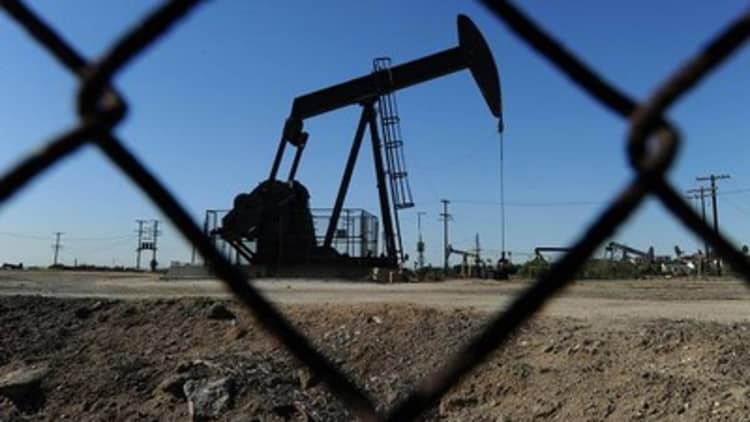U.S. crude settled up $2.22, or 4.5 percent, at $51.43 a barrel on Thursday, its highest settle since March 4 after Saudi Arabia and its Gulf Arab allies began airstrikes in Yemen, sparking fears of a bigger Middle East battle that could disrupt world crude supplies.
The military operation against Houthi rebels, who have driven the president from Yemen's capital Sanaa, has not yet affected oil facilities of major Gulf producers.
But fears the conflict could spread has stoked concerns about the security of Middle East shipments, even as analysts and commentators doubt the probability of an all-out war amid continued signs of crude oversupply.
Read More Is Yemen the new catalyst for oil?
Egyptian officials told the Associated Press Egypt and Saudi Arabia would lead a ground incursion into Yemen to root out the Houthis.
Benchmark Brent oil jumped 5 percent early in the session before giving back some of that in European trade as the dollar rebounded from Wednesday's drop, making commodities denominated in the greenback costlier in other currencies.



were up $2.74 at $59.19 by 2:40 p.m. EDT, closing in on a session high of $59.78.
"A lot of times you get the market reacting dramatically right off the bat to events like these, before people begin putting things in perspective after a greater study of the risks involved," said Phil Flynn, analyst at the Price Futures Group in Chicago.
"That aside, there is a growing realization that the oversupply in crude may not be the only thing in pricing oil now," Flynn said.
Read MoreAre bottom-fishing oil investors complacent?
Yemen's relatively small oil output has been disrupted for months by the conflict. More importantly, Arab producers have to ship their crude past the Yemen coastline via the Gulf of Aden to get to the Suez Canal, a key passageway to Europe.
The waters between Yemen and Djibouti, known as Bab el-Mandeb, are less than 40 km (25 miles) wide. They are considered a "chokepoint" to global oil supplies by the U.S. Energy Information Administration (EIA), which estimated 3.8 million barrels a day passed through Bab el-Mandeb in 2013.
Egypt has sent naval vessels to help secure the sea lanes, while Kuwait boosted security around its oil sites. Iran, which backs the Houthi rebels, denounced the Saudi strikes.
Read More
Michael Cohen, who heads energy research at Barclays, said the conflict potentially exacerbates tensions in Libya, Syria and Iraq, with Saudi Arabia becoming an activist of its regional policy.
"What's going on right now is a trend in the region," he said.
The region is heavily populated with Western military forces. The United States and France operate large military bases in Djibouti. NATO's anti-piracy fleet also operates from the Gulf of Aden.

